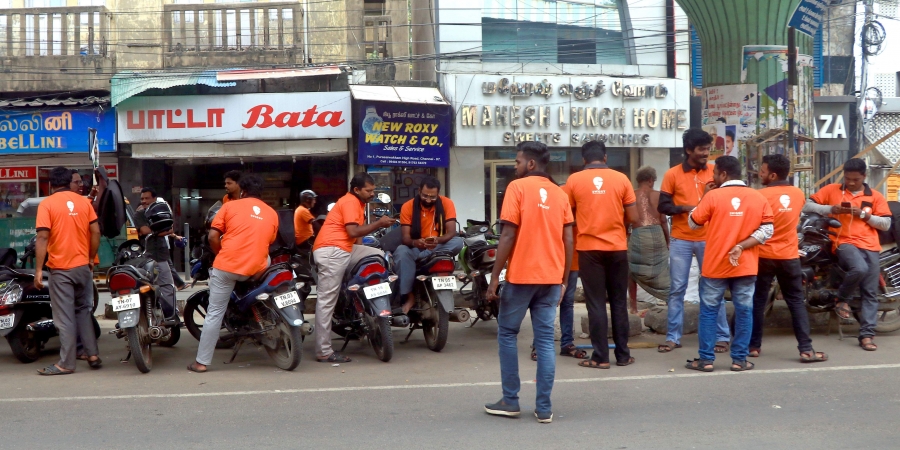The gig economy is prone to suffer the wrath of the outbreak of the pandemic. While some of the companies are thriving, others are having tough times sustaining the crisis. The companies of food delivering domain, travel and tourism domain etc are having humongous losses due to the suspension of visas and travel restrictions. People are becoming extra cautious and thus reluctant to order food online. The contagion has boosted the sales of eCommerce platforms as users are hesitant to go to shops physically. Online solutions are overloaded with user demands during these times.
Associated Chambers of Commerce and Industry of India estimated that the market size of the gig economy could reach $455 billion dollars by 2023. But the sudden outbreak of the pandemic coronavirus has derailed India’s gig economy for quite some time. The companies in this sector like Zomato, Ola, Uber, Airbnb, Oyo, Big Basket, Urban Clap, Urban Ladder, Makemytrip, Swiggy and many more are bracing themselves for the upcoming unforeseen challenges. The lockdown period can also be extended further due to the rising coronavirus cases in India and the rest of the world.
COVID-19 has adversely impacted the disruptive supply chain, reduced consumer demands, lack of required manpower and resources, and sluggish growth rates. The gig economy is facing the wrath of the pandemic. The people are hesitant to engage in any physical contact, and refraining from services like ordering foods from outside or availing ride-sharing services for the daily commute. The nationwide lockdown and the home quarantine of the people have obviously impacted the gig economy of the country.

Source: New Indian Express
Suspended Operations in Gig Economy
Ola and Uber have suspended operations in almost all the places, abiding by the rules of the authority. The official at Ola said that it was planning to continue operations for some limited essential reasons for some reasons, for example, medical purposes etc. It may be the case that the ride-sharing services are incurring a loss of 70-90% due to the lack of movements to prevent the spread of contagion. As reported by Statista, “revenue in the ride-hailing segment in India was expected to post a compounded annual growth rate of 13.5% from 2020 till 2023, achieving a market volume of $54.09 billion by 2023. With the mobility industry coming to a grinding halt due to the pandemic, it will be a tall task to achieve those numbers.”
Between 2020 and 2024, online food delivery is expected to grow at a rate of 9.5%, as recorded by Statista. But the pandemic has made it a tougher challenge. The consumers are reluctant to order food online for practising precaution much needed to contain the transmission of this disease; Zomato and Swiggy are hit badly at present. Mr Rajat Wahi, partner at Deloitte said that “It’s difficult to put a number to it but the food ordering business is down significantly. However, some quick-service restaurants continue to deliver.”
The co-founder of Urban Co. (formerly known as Urban Clap), Mr Abhiraj Bahl said that the business is facing a massive flow due to the outbreak. After the lockdown period is over, the demand in certain categories like cleaning, sanitization, and salon is likely to increase, but that would take some time. He thinks the massage section is negatively impacted and the long recovery period is needed to get back to the pre-outbreak condition. The consumers are in-home quarantine and are reluctant to opt for services at their homes. The steady transmission and the rising coronavirus cases are alarming to a great extent, especially to the gig economy.
Restrictions on Gig Economy for Lockdown
The suspension of visas and all modes of transports have brought the tourism and hospitality sector to a standstill. The domestic and international flight cancellations and total lockdown have hit the aviation and tourism companies really hard. No one knows how much time will be required for recovering such a downfall. According to a prominent business expert Mr Sreedhar Prasad, “Airbnb will face trust deficit once we recover from the coronavirus outbreak owing to the fact that the company doesn’t have direct control over the inventory listed on its platform. They have no clue on what the owner has done and who has stayed in the room before. Therefore, it would be a challenge for Airbnb to win consumer trust as compared to big hotels that already have high sanitation standards.” He also added, “I feel the recovery of the shared and rental economy will be slower than established hospitality players.”
The danger of unemployment is looming large on the shared economies of India and also the world. Many workers are migrants, and they have been moving to their hometowns and villages prior to the nationwide lockdown with the fear of the lack of job opportunities in future. Many delivery executives are avoiding to go to the workplace for the fear of the police brutality. In many places in India, the police are physically assaulting the delivery executives for going out on the roads. The lack of delivery executives and manpower is a grave concern for the gig economies across the country.
The chief operating officer and co-founder of an online marketplace for foods and groceries Jumbotail, Mr Ashish Jhina said, “We are motivating contract employees to continue to report to work. This is a big challenge. There is fear among delivery executives and warehouse staff to move to/fro from their residences. Leaders at all levels are visiting these supply chain locations and motivating the staff, and leading from the front.”

Gigs and Effective Remote Work
Many firms of the gig economy and startups have started work from homes, but that cannot be the case for all the workers in the gig ecosystem. Many employees are provided with official laptops for working from homes. Maintaining equilibrium in business is still a farfetched dream. All the various functions of gigs cannot be operated from the safety of homes. Say, for example, the job roles like coding and content creations can be done from homes. But field jobs like that of the delivery executives cannot function remotely. The consumers have become more and more dependent on the online startups and gigs, like medicine delivering app Pharm Easy, iMed etc, Big Basket, Fresh to Home etc for daily essentials like groceries and meat. But, lack of manpower is a constraint in smooth operations at the time of the pandemic.
The safety and security of the delivery executives visiting various houses across the cities is a great concern. As reported by The Economic Times, “In a ‘response note’, online grocer Big Basket said warehouse employees handling fruits and vegetables use disposable masks and gloves. Workers are being scanned for any symptoms and offices have been equipped with sanitisers and delivery staff with disposable gloves that are changed after every delivery.”
Some Profitable Gigs During COVID-19
When major proportions of gig economies and start-ups are having a hard time coping up with the situations, some of them are witnessing a spike in their business growth. The videoconferencing and virtual meetings seem to be the only way to continue the smooth operations of the agile workforce functioning remotely. The co-founder of Bengaluru based Hiver, which provides an online platform for email collaboration; Mr Niraj Ranjan Rout said that his company has gained momentum now due to the increasing number of users.
The Edtech sector is also booming with online classroom and study materials available for the students of a diverse range. The schools, colleges, universities and educational institutions are shut down due to the outbreak of coronavirus. This has affected thousands and such crisis have created growth opportunities for the Edtech startups. Companies like BYJU’S and Unacademy are helping the students with online lessons and study materials, thus observing an uptick in their number of subscribers.
The time of uncertainty has given a boost to the freelance economy. With working from home identified as a suitable form of engagement, many top gigs are hiring freelance consultants and experts for time-bound project execution. The organizations can get their job done by freelance consultants without bearing the expenses of permanent staffing. Outsourcing the job roles seem to be a feasible option for many organizations and top gigs.
The VP Enterprise for Toptal, Michael Kearns said, “Clients are very focused on learning how to do remote right, and work is still getting done so there is still a need for freelance expertise. This plus the sudden openness to remote will drive more freelance work as well as more enablement work for suddenly remote teams to learn how to do it right. So, freelancers will help the work transition.”
Chandrika Pasricha of India’s Flexing It said, “For us, business is actually up – we continue to see strong growth in demand for our consultants, both in India and from our international clients who leverage us for remote consulting/research support. Happy to share more details if helpful.”
The Fear of Unemployment
Unemployment and lay-offs seem to be quite possible during such times of uncertainty. But several companies are taking extra measures like rationalization of expenses and trying to be more humane amidst the critical situation. Cost control in areas like travel, bonuses, and training expenses can save up to 5-6% of HR cost and thus situations like layoffs and pay cuts can be averted. Ensuring reasonable hike in the next fiscal year (fortunately, by then, coronavirus will have mercy on mankind) can keep the employees motivated. The communication channels across organizations must be transparent and active for keeping the business ticking.
The Managing Director of Bradford Consultants, Mr Aroon Kumar Aggarwal said, “this is a unique situation for employers and employees equally, but organisations should take a sympathetic and rational view towards their staff.” He also added that “the coronavirus situation is already helping companies experiment with the work-from-home option and understand its impact on business efficiency and faster adoption of latest technology tools can be a new normal.”
Conclusion
There is no industry that is unaffected by the outbreak of the pandemic. Startups and gigs economy is affected as well, but not like the aviation and tourism sector. While some businesses are thriving during the tough times, some fear permanent closures. The time calls for a rational approach and collaboration. Technology-led automation can aid the businesses, but at the same time would lead to the problem of unemployment. Several organizations are getting accustomed to the remote work culture, which is probably beneficial for the future. Coronavirus is not the first pandemic of the world, and unfortunately will not be the last one as well.

